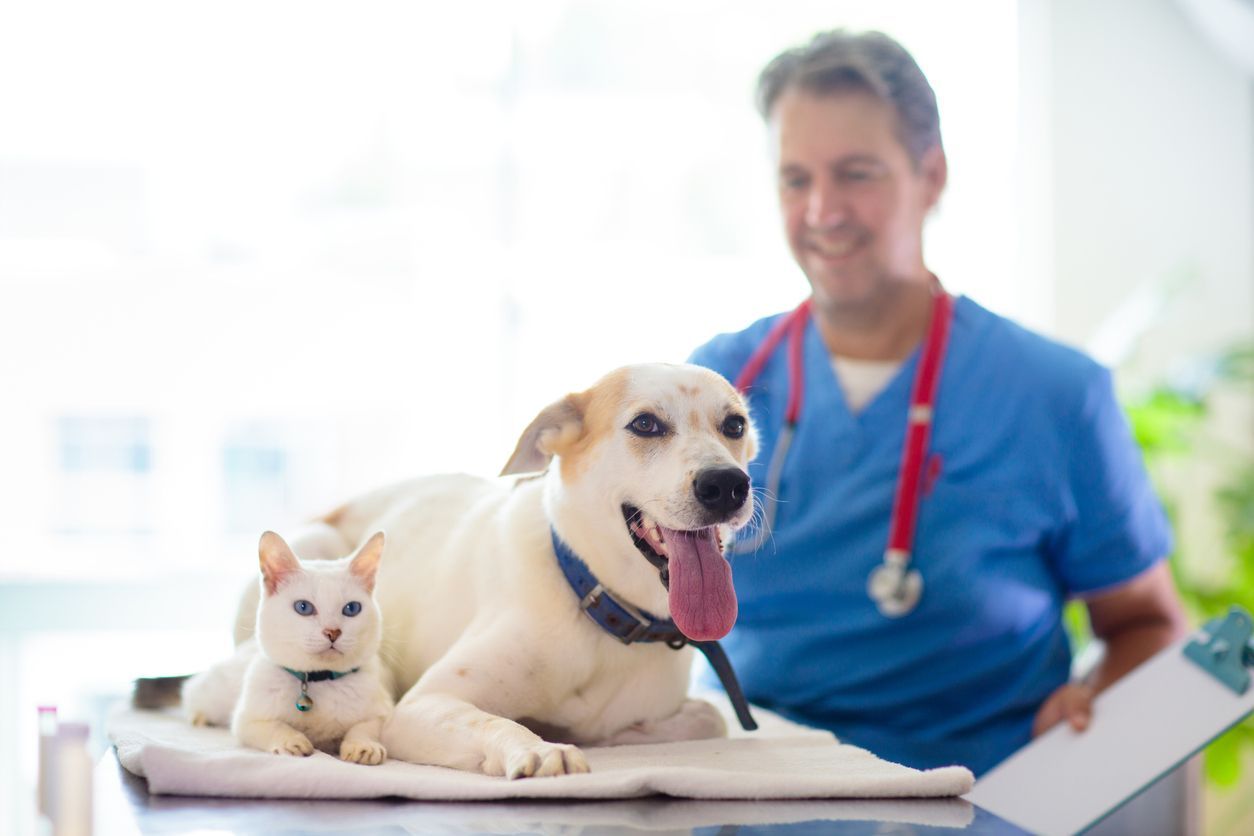How much does a DNA test for your dog or cat cost?

In recent decades, the industry of veterinary medicine has made great technological advances. A range of new procedures and devices are available, some of which seemed impossible not too long ago. One of the most exciting and interesting advances is DNA testing. A DNA test has a variety of functions and purposes and can be of use to breeders, owners, and vets alike. Read on if you have ever wondered:
- What can a DNA test do?
- How does my pet take a DNA test?
- How accurate are my pet’s DNA results?
- What is the cost of a DNA test?
The cost of a DNA test for your cat or dog can range from CAD $110 to CAD $274, depending on how detailed you’d prefer the results to be and a number of other factors.
What can a DNA test do?
There are two main reasons to test your pet’s DNA: to learn about your pet’s ancestry and pedigree or to learn more about their health.
Ancestry
One fun function of a DNA test is revealing which breeds make up a crossbreed dog. Many dogs who come from unknown sources or end up in rescues and shelters are not pedigrees, and new owners are sometimes curious to know which breeds have contributed to their dog’s genetic makeup. Beyond satisfying your curiosity, knowing your dog’s pedigree can help you better understand their behavior and their training and socialisation needs.
For example, if a dog’s pedigree is made up of mostly working breeds, providing them with physically and mentally challenging tasks from day one keeps them occupied and prevents behavioral issues from developing. Similarly, if a Labrador cross turns out to be more closely related to a guarding breed like a Chow Chow, providing a good deal of positive socialization when young can help them avoid forming a habit of aggressive and territorial behavior.
Health
DNA testing can provide information on which diseases a dog is more prone to developing and also help diagnose rare genetic conditions. Knowledge of an animal’s genetic makeup provides vets with a vast amount of information regarding their health.
A good breeder values the health of their animals and ensures only the healthiest dogs and cats are bred. Nowadays, responsible breeding often means running DNA tests to ensure that the two chosen parents are healthy genetic matches.
For instance, more and more breeders are testing their cats, especially susceptible breeds such as the Persian and Chinchilla, for polycystic kidneys before they are bred. If genetic carriers are not bred, the chances of kittens developing these conditions shrinks massively.
DNA profile or unique fingerprint
One of the lesser-known functions of DNA testing is animal identification. While a tag on your pet’s collar and a microchip inserted under their skin are good ways of identifying your pet if they are lost or stolen, mapping their DNA provides proof of identity that cannot be manipulated.
Amazingly, DNA is used by the police in cases of canine kidnap. Owners of very valuable dogs and cats see DNA profiling as a great security feature.
What can’t a DNA test do?
Just because a dog has genes that cause certain traits, does not mean those traits are guaranteed. DNA is not always predictable and new scientific breakthroughs happen every day. While DNA test results provide some useful information and predict certain traits and conditions, the results are best read by a vet to be accurately interpreted. It is worth having an expert interpret DNA results, especially when looking at a health profile.
What is the procedure and will it hurt my pet?
The procedure to extract DNA is straightforward and well tolerated by cats and dogs. Typically, a swab is taken by collecting saliva from the inside of an animal’s cheek. The collected saliva and skin cells are then analyzed. Less commonly, a blood test is taken. Most owners can do this from the comfort of their own home and the process is over in seconds.
How accurate are the results?
DNA results must be considered with caution. While most companies claim an accuracy of up to 90%, this still means that one in ten results are not correct. The accuracy is dependent on a number of factors, including how the DNA was harvested and which lab interprets the results.
It’s also important to keep in mind that carrying a certain gene or mutation does not guarantee the presence of a specific condition. Similarly, the lack of a certain gene does not guarantee the absolute absence of a related condition.
DNA testing has limitations. Some experts are quite sceptical of DNA testing, especially as many of the initial studies measuring accuracy only evaluated small sample groups. However, the more reliable companies constantly hone their information and actively update their databases with each new patient they test. As studies and research improve over time, the results become much more accurate.
Is there a difference between dog and cat DNA tests?
Test results for cats are not as easy to analyze as test results for dogs. Domesticating and selectively breeding dogs for many years has created unique DNA profiles for a wide variety of breeds. The same cannot be said of cats.
When comparing a Chihuahua to a Great Dane, the differences in their DNA are evident in their vastly different appearances. We do not see this same variability in cats.
As feline DNA is not easy to differentiate, DNA tests are not not as accurate when distinguishing cat breeds. However, these tests can help you learn about your cat’s ancestry and can tell you the regional origin of your cat’s breed, such as Europe, Asia, or Africa.
What is the cost of a DNA test?
The cost of a DNA test depends on the company that produced the test and also on what information the test provides. A test exploring a dog’s lineage but not their health is generally less expensive. DNA fingerprinting tends to be the cheapest option. If you’re looking for more specific health results, there is usually a fee for each test.
As more and more companies offer DNA testing for pets, the product competition drives costs down. Each year, DNA testing becomes more affordable, especially in countries such as the United States and England.
The most basic test, which just interprets breed or ancestry, can cost as little as CAD $110. Conversely, a more detailed test intended to reveal a general health profile can cost up to CAD $274. Companies who screen for more diseases in their panel tend to charge more.
Many kennel clubs offer specific tests for each breed of dog, and those tests often include a DNA profile. As an example, the UK Kennel Club provides testing for several pedigrees. Their papillon-specific package costs CAD $246 and includes tests for neuroaxonal dystrophy, progressive retinal atrophy, and type 1 von Willebrand disease.
Is DNA testing done at a vet clinic?
Most owners do not need to go to their vet clinic to perform these tests. Many companies send a testing kit by mail to the owner’s home address, where the test can be performed. This is especially useful for cat owners, as cats are not usually the happiest of travellers.
If you have any questions about DNA tests and how to use them, you can book an appointment with an online vet through Vetster. The vet can discuss which test would offer the most value to you and your pet. Results can also be discussed so owners can better understand their significance.
Do vets ever recommend genetic testing for a patient?
While not commonly used as a diagnostic tool, there are times when a vet may advise a genetic test to help diagnose specific diseases or disorders, such as ichthyosis in golden retrievers. Vets generally go through a number of different tests prior to diagnosing an animal. Early genetic testing can give a vet the evidence they need to make a diagnosis without the use of more invasive tests.
What are the ethical implications of DNA testing?
Are there any downsides to learning more about the genetic makeup of your pet? Some breeders worry that their breed may change significantly if the sire and dam are chosen based on DNA results. This is potentially true, though there are positive effects to changing the DNA of a breed as well.
Cambridge University is researching the genes associated with brachycephalic obstructive airway syndrome (BOAS) in an attempt to create healthier versions of snub-nosed dogs. The dogs selected to breed may have longer snouts and less wrinkly skin, which would improve their health and breathing.
One ethical concern regarding DNA testing is that an owner or breeder may act on the results even when no action is necessary. For example, an animal who has a marker for a certain disease but does not actually have that condition may be prematurely put to sleep by an owner who thinks that their pet is unwell.
Are DNA tests worth the cost?
The value of a DNA test depends on whether the owner or breeder gains useful information from the results. It’s important to understand the limitations of DNA testing and to take the health of each individual pet into consideration when interpreting test results.
When it comes to finding the breed of a dog, DNA testing can usually provide a cheap and accurate answer. The same is true of finding a dog’s unique genetic fingerprint for ID purposes. However, learning about the diseases your pet is prone to can be more complex. Speaking to a vet can help you decipher your pet’s DNA results and give you an idea of how to address any health concerns their test might reveal.












